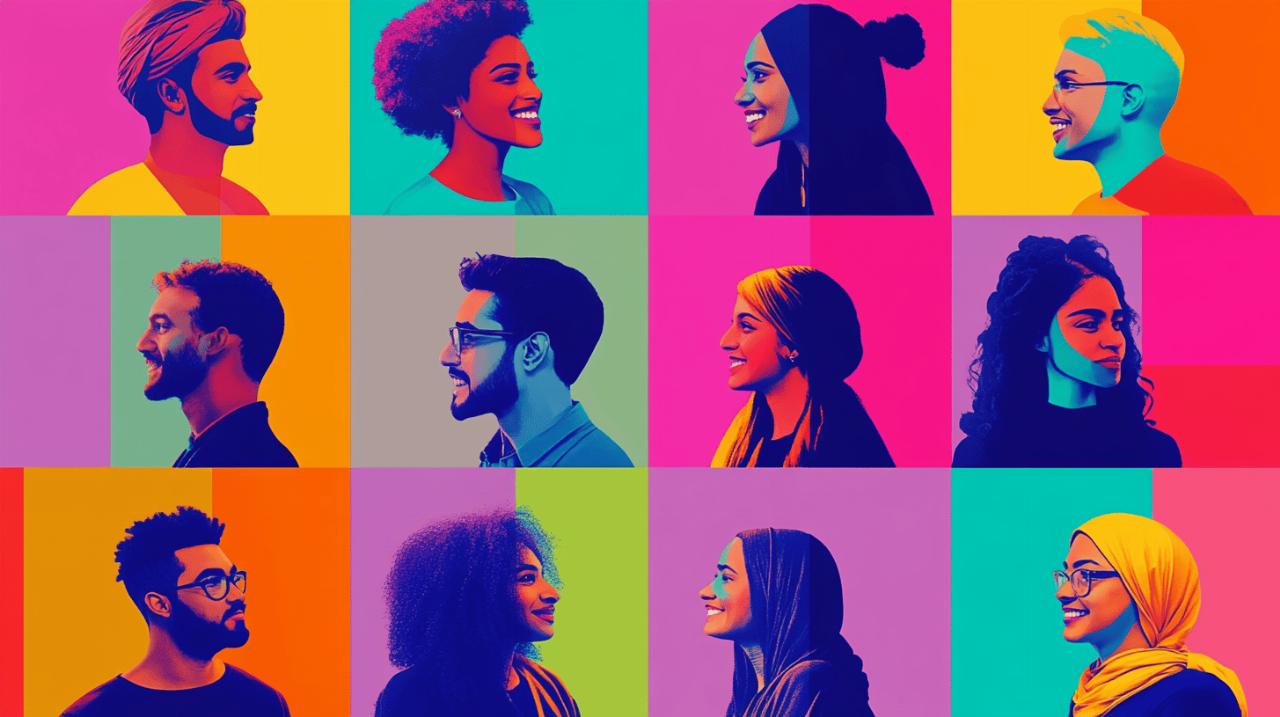How Kelma-chat, le site de chat pour les beurs gays et blacks gays, lesbiennes arabe et rebeu Is Inspiring LGBTQ+ Communities of Colour in the UK
In the diverse tapestry of Britain's LGBTQ+ online communities, Kelma-chat has emerged as a distinctive platform that addresses the unique experiences of queer individuals from North African, Arab, Black, and mixed heritage backgrounds. While originally created with French users in mind, its approach and ethos have sparked interest and inspiration among similar communities in the United Kingdom. This online space facilitates connections, conversations, and relationships for people who often navigate the intersection of multiple identities in British society.
The Rise of Kelma-chat in UK's Diverse LGBTQ+ Landscape
As Britain continues to embrace its multicultural identity, digital platforms that acknowledge and celebrate the intersection of cultural heritage and sexuality have become increasingly important. Kelma-chat stands out as a model that UK-based communities are taking notice of, providing a virtual meeting place for gay men of North African descent, Black gay men, and Arab and 'rebeu' (second-generation North African immigrant) lesbians who wish to connect with others sharing similar backgrounds and experiences.
Creating digital spaces for underrepresented voices
The traditional LGBTQ+ spaces in Britain, both physical and digital, haven't always fully addressed the nuanced experiences of queer people of colour. Kelma-chat's approach demonstrates how digital platforms can be designed with specific cultural contexts in mind, allowing users to express themselves authentically without having to compartmentalise different aspects of their identity. This has inspired conversations among British LGBTQ+ community organisers about how to better serve diverse populations through technology.
Bridging Cultural Identities within the British LGBTQ+ Scene
For many British LGBTQ+ individuals with North African, Arab, or Black heritage, navigating between cultural communities can be challenging. Platforms modelled after Kelma-chat offer a blueprint for how digital spaces can acknowledge the complex interplay between cultural backgrounds, family expectations, religious considerations, and queer identity. This resonates particularly in major UK cities like London, Birmingham, and Manchester, where diverse LGBTQ+ communities are seeking ways to build stronger connections.
Features and Functionality that Foster Connection
What makes Kelma-chat's approach noteworthy for British audiences is its thoughtful design that prioritises both connection and discretion. The platform's structure includes comprehensive profile options, photo sharing capabilities, and messaging systems that make it easier for users to find meaningful connections, whether they're looking for friendship, romance, or community.
Personalised Profiles and Privacy Options for UK Users
In Britain's diverse urban centres, privacy concerns can be particularly important for LGBTQ+ individuals from cultural backgrounds where coming out might present additional challenges. The platform's emphasis on confidentiality and privacy controls, including options for private photo albums and discretion settings, provides a template for how British online spaces could better serve similar communities. Users can choose how much information they share and with whom, creating a safer environment for self-expression.
Messaging systems that build meaningful relationships
Beyond just facilitating casual chats, the messaging features allow users to develop deeper connections over time. For UK residents who might feel isolated within either mainstream LGBTQ+ spaces or their cultural communities, having dedicated channels to build relationships with others who understand their specific lived experiences is invaluable. These communication tools enable conversations that acknowledge the full spectrum of users' identities, rather than forcing them to focus on just one aspect of who they are.
Impact on British LGBTQ+ Communities of Colour
The existence and success of platforms like Kelma-chat have sparked important conversations about representation and inclusion within British LGBTQ+ digital spaces. Community leaders and developers in the UK have begun examining how similar approaches might benefit local communities, especially in areas with significant populations of people with North African, Arab, or Black heritage.
Supporting identity exploration in multicultural britain
For young British LGBTQ+ people from diverse cultural backgrounds, finding spaces that honour all aspects of their identity can be transformative. Digital platforms inspired by Kelma-chat's model provide opportunities for users to explore the richness of their intersecting identities without pressure to conform to expectations from any single community. This has particular resonance in a British context, where multiculturalism exists alongside ongoing conversations about integration and belonging.
Building solidarity across cultural backgrounds
While focusing on specific cultural communities, these platforms also create opportunities for solidarity and understanding between different groups within the broader LGBTQ+ umbrella. In Britain's increasingly diverse society, this model demonstrates how digital spaces can simultaneously celebrate specific cultural identities while building bridges between communities that face similar challenges. The result is a more nuanced and inclusive approach to LGBTQ+ community-building that recognises the diversity of experiences within the broader movement.
The Future of Inclusive Digital Platforms in the UK
As British society continues to evolve, the lessons from platforms like Kelma-chat offer valuable insights for developers and community organisers looking to create more inclusive digital spaces for LGBTQ+ people of colour.
Lessons from Kelma-chat for British Online Spaces
The success of Kelma-chat's approach suggests that there's significant demand for digital platforms that address the specific needs of LGBTQ+ communities of colour. British developers and community organisations have begun exploring how similar models might be adapted for the UK context, taking into account the particular cultural dynamics and needs of Britain's diverse population. The emphasis on both connection and privacy provides a blueprint for creating spaces that serve communities where discretion might be particularly valued.
Expanding representation in britain's digital lgbtq+ communities
Looking forward, the inspiration drawn from platforms like Kelma-chat is likely to contribute to a broader transformation in how digital LGBTQ+ spaces in Britain approach questions of cultural identity and representation. Rather than treating LGBTQ+ identity as uniform across cultural backgrounds, there's growing recognition that effective digital communities need to acknowledge and celebrate the diverse experiences of their users. This evolution promises to create a more inclusive digital landscape that better reflects the rich diversity of Britain's LGBTQ+ population.
Safe Spaces and Community Building for Intersectional Identities
In the UK, platforms like Kelma-chat are transforming how LGBTQ+ people of colour connect with each other. This chat website originally designed for gay men of North African origin in France, Black gay men, and Arab and 'rebeu' lesbians has gained traction among British users navigating similar identity intersections. The platform facilitates online conversations, connections, and meet-ups through profiles, photo albums (including private options), and messaging systems. Kelma-chat specifically aims to connect gay, lesbian, and bisexual individuals from North African, Arab, and Black backgrounds, as well as those with mixed heritage. The site prioritises privacy and confidentiality through robust policies, creating a secure environment where users can forge meaningful friendships and relationships with like-minded individuals who share similar cultural experiences.
Navigating multiple minority statuses in british society
Many LGBTQ+ people of colour in Britain face unique challenges when navigating spaces that often fail to acknowledge their full identities. For British Arabs, North Africans, and Black LGBTQ+ individuals, finding communities that honour both their ethnic and sexual identities can be particularly difficult. Mainstream LGBTQ+ spaces in the UK sometimes lack cultural sensitivity, while some ethnic community spaces might not be affirming of diverse sexualities. Kelma-chat addresses this gap by creating a digital environment where these intersectional identities are not just accepted but celebrated. The platform allows users to express themselves authentically without having to compartmentalise different aspects of their identity. This integration is vital for many British LGBTQ+ people of colour who might otherwise feel pressured to downplay either their cultural heritage or their sexuality in different social contexts.
How kelma-chat promotes mental wellbeing among uk lgbtq+ people of colour
The psychological benefits of spaces like Kelma-chat extend beyond simple social connection. For many LGBTQ+ people of colour in Britain, having access to a community that understands both the ethnic and sexual dimensions of their identity can significantly reduce feelings of isolation. The platform offers users the chance to discuss shared experiences, from navigating family expectations to dealing with both racism and homophobia in British society. This peer support network serves as an informal mental health resource, allowing members to share coping strategies and success stories. The privacy features of Kelma-chat are particularly valuable for those who may not be publicly out in all aspects of their lives—a common reality for many LGBTQ+ people from conservative cultural backgrounds. By providing a secure digital space, the platform enables users to explore their identities at their own pace, contributing to better overall wellbeing and self-acceptance.
